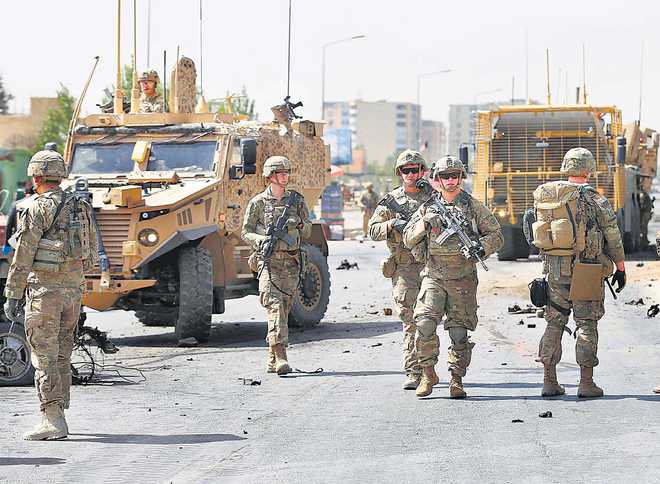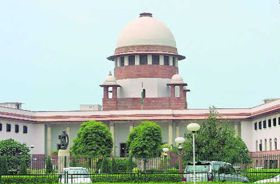
ON ALERT: A low-intensity war will give the US a reason to not pull out its troops.
MK Bhadrakumar
STARTING with the visits to New Delhi by Russian presidential envoy Zamir Kabulov and by Afghan President Asharf Ghani soon thereafter, to the regional tour by the US Secretary of State Rex Tillerson, recent weeks have thrust the Afghanistan issue to the forecourt of regional politics. The emergent regional alignments hold dark forebodings that the Afghan problem is not going to be solvable in a near-term scenario.
The interplay of three templates holds the key to the future scenario — US strategy toward Afghanistan; US-Pakistan relations; and, the power dynamic regionally and internationally. The US strategy announced in Washington in August continues to be essentially the same as before, with some tweaking here and there in the ‘terms of engagement’ of the US military, in the use of air power and troop deployments. The stalemate continues on the ground and the security situation shows no signs of improvement. The Taliban, which is in virtual control of around 40 per cent of the country, has stepped up its offensive with deadly attacks on high-profile targets displaying its resolve to continue the war. No target is beyond Taliban’s reach. (The two-hour meeting of Tillerson with Ghani during his stopover last week took place in a windowless ‘strong room’ deep inside the sprawling Bagram base.)
On the other hand, a potentially dangerous political crisis in Kabul, with an unbridgeable trust deficit at the leadership level, has caused paralysis in governance. Nothing brings this home more dramatically than that the three top Afghan leaders who visited India recently — foreign minister Salahuddin Rabbani, chief executive officer Abdullah and President Ashraf — themselves belong to rival factions with divergent agenda. The old Kissinger question comes to mind: ‘Who do I call if I want to call Europe?’
Washington is acutely aware that the legitimacy of the Kabul regime must be regained somehow. Tillerson made it clear to Ghani that elections should be held not later than next year. An explosive contestation for power is brewing. Yet, unlike the Obama administration, which was politically savvy in knocking Afghan heads together, Trump and Tillerson have shown neither the interest nor the capacity and credibility to act as mediators mentoring orderly transition. This is despite the US spending roughly $8 billion annually on Afghanistan (which has a GDP of $2 billion). The US is openly courting India to put more money on the table. There is a desperate need to end the war.
The sensible thing is to negotiate a settlement with the Taliban. But the Taliban has been demanding the vacation of US occupation, which, of course, Washington cannot concede, given the imperative of maintaining an open-ended military presence in the hugely strategic region for the pursuit of its containment strategy against China, Russia and Iran. A low-intensity war will suit American interests perfectly by giving the US the alibi to keep a permanent military presence, which is the core objective of its Afghan strategy. But then, the Taliban must oblige. The only way this contradiction can be resolved will be by persuading Pakistan to leverage its influence with the Taliban to show flexibility. Thus, as never before, Pakistan’s role becomes of crucial importance to the efficacy of the US strategy.
The Trump administration has threatened Pakistan with dire consequences unless it cooperates. However, Tillerson’s visit to Islamabad revealed that Pakistan is hunkering down. Unlike in the tumultuous past history between the two erstwhile allies, the US lacks any real influence on Pakistan. Pakistan is no longer a recipient of US assistance, especially military aid. The China-Pakistan Economic Corridor is set to bring in massive foreign investments and the growing economic buoyancy strengthens Pakistan’s grit to resist US pressure. Pakistan harbours deep misgivings about the US’ intentions toward it by keeping an open-ended military presence in neighbouring Afghanistan while also encouraging India to be proactive. Pakistan has strategic options in the current regional and international situation to work with like-minded regional states who, for reasons of their own, also want to get rid of the US presence in Afghanistan.
A fundamental contradiction is that the US, which faces the prospect of steady retrenchment in Southeast Asia, is keenly wooing India, ostensibly to create a regional alliance system to contain China. This dalliance grates against the strategic axis between China and Pakistan. Among the regional states, India figures as the only country that identifies with the US’ Afghan strategy. Of course, the US-Indian congruence is as much about Pakistani policies as about China’s growing regional influence. Washington and Delhi oppose the CPEC, which gives China access to the world market through territories that are beyond American control, while also enhancing Pakistan’s strategic autonomy to withstand US and/or Indian pressure. Ghani’s visit to Delhi displayed a mutual intent to boost security cooperation to provide a regional underpinning to the open-ended US military presence in Afghanistan.
To be sure, a geopolitical divide is steadily developing. Kabulov’s recent consultations in Delhi; Ghani’s unprecedented allegation on the eve of his visit to Delhi that Russia ‘supports’ the Taliban — and Moscow’s rejoinder questioning his locus standi to speak for all Afghans — visit by former Afghan President Hamid Karzai to Tehran — all these underscore the growing perception among regional states that the continued US presence in Afghanistan is driven by geopolitical considerations rather than the fight against terrorism or the Taliban. Given the dubious US role in the rise of the IS in Iraq and Syria, it is not surprising that Russia and Iran (and Central Asian states) suspect that the US might resort to the use of similar Islamist groups in Afghanistan as its geopolitical tools. Simply put, the US’ containment strategies against Russia, Iran and China are fuelling geopolitical rivalries in the region, which, in turn, are inexorably transforming the alchemy of the Afghan conflict.
As things stand, the US is in no mood to abdicate on own volition. Equally, it is improbable that the regional states (Pakistan, Russia, Iran and China) seek to confront the US on the ground; but then, they can create a ‘bleeding wound’ for the US. The duration of a debilitating proxy war will ultimately depend on the US throwing in the towel. The US cannot win a proxy war without having a single ally globally who is prepared to slug it out. But then, it is within US capability to keep in a state of ‘suspended animation’ the hugely strategic region of Central Asia through which three trajectories of China’s One Belt, One Road are expected to run, and which borders Russia, China and Iran.
The writer is a former ambassador



























